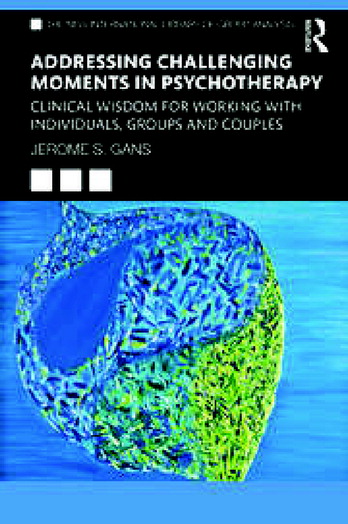by Jerome S. Gans, M.D.; New York, Routledge, 2022, 124 pages
Jerome S. Gans’ aptly titled book, Addressing Challenging Moments in Psychotherapy: Clinical Wisdom for Working With Individuals, Groups and Couples, creatively depicts familiar situations in psychotherapy that leave the therapist perplexed and feeling the need for self-exploration or consultation to better understand what is going on in the “therapy space” and what to do about it. Although it is only 124 pages long, this compilation of thorny clinical situations is a treasure trove of knowledge and wisdom acquired over 48 years dedicated to the practice of psychotherapy—a must-read for the novice and seasoned clinician alike. The volume presents abundant relatable experiences and encounters, with fresh and clarifying insights.
In the introduction, the first of three parts, Gans offers some keen clinical observations of human nature. We are reminded, once again, that the troubling aspects of our lives are always palpable in the therapy room. From a generally psychodynamic and more specifically relational framework, Gans richly reviews frequent presentations and enactments with difficult, troublesome, frustrating, and traumatizing patients and illustrates how insightful the use of countertransference can be to help navigate these complicated terrains.
The second section of the book, titled “Clinical Observations,” is a loosely assembled collection of vignettes that illuminate some fundamental and contemporary psychotherapeutic principles of working with patients in complicated situations. For example, in his initial chapter, “The Way I Am With You Partly Determines the Way You Are With Me,” Gans reminds us of the utility of seeing the therapy enterprise as a cocreated, two-person situation. In the next chapter, “With Some Patients There Is No Risk of Ever Establishing the Truth,” he underscores the importance of ongoing assessment, not only as an exercise in labeling but also as an ongoing and comprehensive accounting of all the patient’s ego functions, from capacity for reality testing to maturity of defenses. The chapter delivers a valuable lesson in the utility of evaluating emotional health as multidimensional continua. With illuminating and true-to-life clinical vignettes, Gans provides some half-dozen other observations, including the crucial stance of compassionate neutrality (i.e., not taking sides despite temptations and invitations to do so) in couples therapy. Gans also explores the roles of compassion, support, and kindness in countering the deeply ingrained adverse effects of early shaming experiences. He reminds us that when we become impatient with a patient’s progress, we need to remember that (most of the time) patients are doing their best. Sometimes innocuous comments or actions can be valuable for appreciating and understanding the patient. The simple yet complex act of a patient arriving late leaves much room for discussion and interpretation. The section ends with a powerful, unique discussion of shame and a potent, resonant description of the negative introject. The final chapter presents a series of prescriptions in the form of clever, pithy ideas for patients to carry with them as transitional objects.
In the 10 chapters that comprise “Clinical Pearls,” Gans continues, with warmth and wisdom, to highlight approaches to a range of clinical dilemmas in group and individual therapy. He usefully differentiates therapeutic process from “complaining and explaining” and educates us about how to deepen reflection and exploration. Gans reminds us how to maintain curiosity when faced with patients who intimidate us. He offers several ways of using our own internal worlds—our countertransference—in the service of treatment, such as framing our reactions to patients with questions intended to deepen reflection. Many other insights relate not only to what is spoken but also to what is not being said. Omissions by patients can be central to and can guide the work. Explore with the patient; don’t act or fix. Find creative ways to deal with the patient’s resistance to reflect and respond. Gans suggests that pain is often “gift wrapped.”
Looking back on his career, Dr. Gans brilliantly synthesizes frequently encountered impasses that impede therapeutic progress and provides us with easy-to-grasp examples and insights to move the field of psychotherapy forward. What a lovely gift. Thank you, Dr. Gans.


